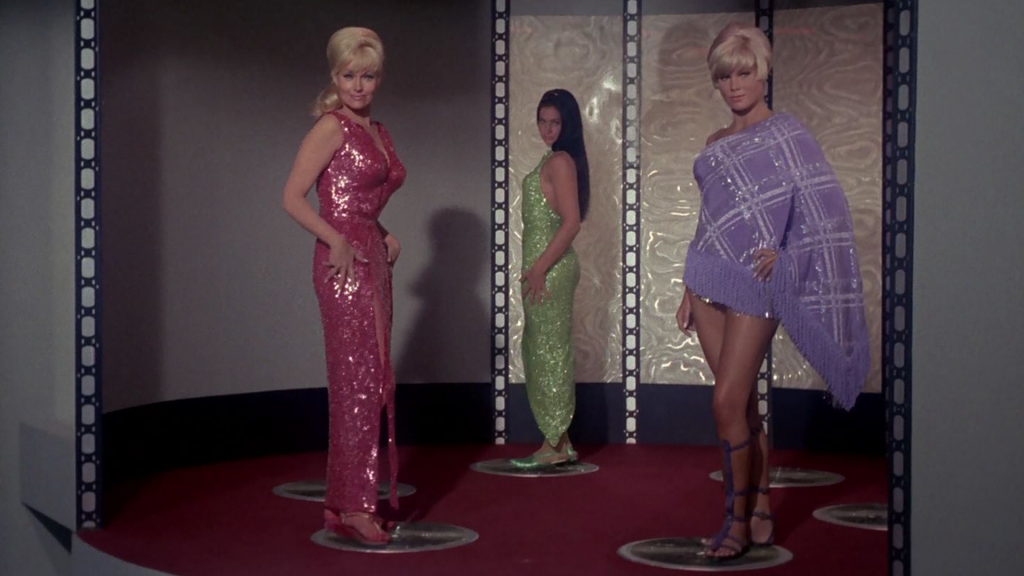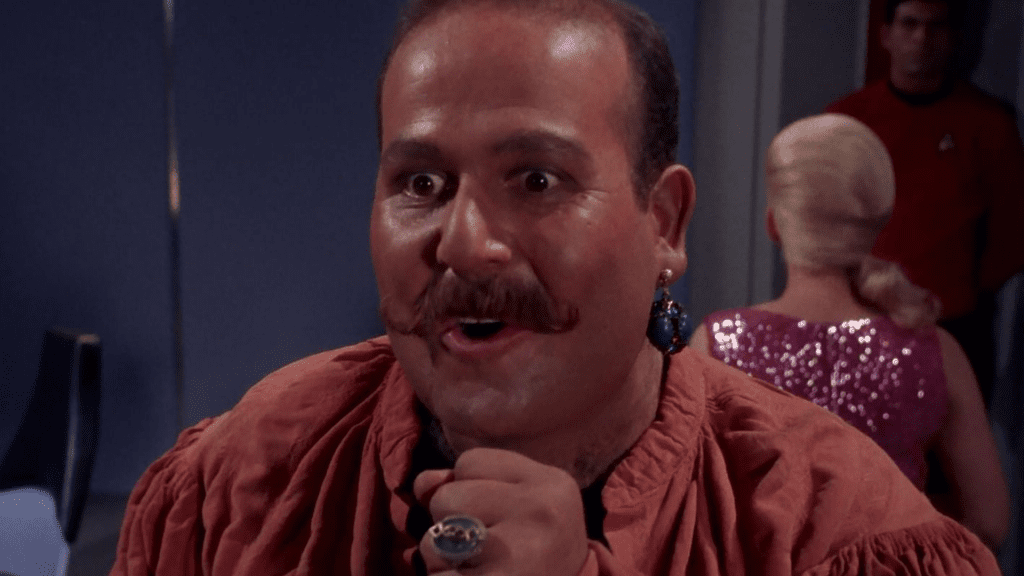“Mudd’s Women”
Original airdate: 13th October 1966
Teleplay by: Stephen Kandel
Story by: Gene Roddenberry
Directed by: Harvey Hart

In a nutshell: The show’s first bad episode is a tonal mess whose only saving grace is a fun guest villain.
“Oh! The sound of male ego. You travel halfway across the galaxy, and it’s still the same song.”
The Enterprise is damaged during its pursuit and apprehension of Harry Mudd (Roger C. Carmel), a slippery intergalactic criminal and his “cargo”: three women whose unnatural beauty soon endangers the ship and its crew.
Another first for Star Trek, “Mudd’s Women” is the series’ first skippable entry. Apparently considered daring and boundary-pushing upon its initial release, the episode is a tonally inconsistent jumble of ideas and depictions that are clearly at odds with Trek’s progressive ideology.
It’s difficult to review an episode like this through a contemporary lens. The series, rapidly approaching its sixtieth anniversary as I write this, is frequently described as a product of its time. But while its filming techniques, special effects, set design and acting may have aged the storytelling and ideas of many of its episodes remain powerfully resonant decades later.
“Mudd’s Women” is not one of those episodes.
The show’s opening minutes are easily its best with the Enterprise chasing an elusive and unidentified vessel through a treacherous asteroid field. It’s a brief cold open that builds suspense quickly while also showing Kirk’s commitment to doing the right thing despite the danger. “Risk is part of the game if you want to sit in that chair” the legendary Captain would say years later during a similar life-or-death situation.
If only the rest of the episode was as good. At the cost of its engines, the Enterprise successfully saves the lives of those aboard the vessel, a man later revealed as wanted criminal Harry Mudd, and three beautiful women whom Mudd smirkingly refers to as “me cargo”. How do we know these women are beautiful? How couldn’t we? The music swells as Scotty and McCoy ogle at them, their professional instincts lost in a moment of lustful enchantment. Even Spock seems taken aback, his Vulcan discipline no match for the women who spend what seems like an eternity posing on the transporter pad.


It’s cringe, but harmless nonsense – a moment where the “free-love” horniness of the show’s producers bubbles to the surface. I’ve always laughed at these scenes, as supposedly evolved humans – a crew of established space professionals – struggle to get anything done in the presence of good-looking people.
A small saving grace is guest star Roger C. Carmel, whose moustache-twirling Mudd makes for one of Trek’s great villains. Carmel’s flamboyant, scenery-chewing performance is a lot of fun to watch; an excellent foil for Kirk whose constant scheming can be seen in every nervous twitch. A standout moment comes during his hearing as he tries (and fails) to hide his true identity and crimes from the ship’s under-utilised lie detector.


His performance is mostly remembered for its comedic aspects, but there’s also a darker edge to the character, most obvious during a key scene where the true nature of the women is revealed. Mudd is little more than a petty con man and pimp, trading the lives of his women whose disarming beauty comes artificially through the consumption of drugs.
You’d think an episode centred around the ideas of prostitution, human trafficking and substance abuse would make for a heavy drama. “Mudd’s Women” opts for a different approach with its presentation kept light and mostly comedic. The show eventually morphs into a bizarre sitcom as the Enterprise arrives at Rigel XII. There Eve (Karen Steele), the most developed of the three female characters, enters into a bickering domestic relationship with one of the miners who eventually discovers her true self as the effects of Mudd’s “Venus” drug begin to fade.


In the finale, Kirk and Mudd arrive at the miner’s home, the Captain having discovered Mudd’s plan and the truth behind Eve’s beauty off-screen. Eve takes another pill which restores her beauty, but soon learns that it was actually a placebo – her beauty never came from the drug, but rather her belief and self-confidence. Satisfied, Eve chooses to stay on Rigel XII as Kirk and Mudd make light-hearted jokes about the latter’s crime and punishment. Cool.
It’s a tidy resolution with a well-intentioned message, but it’s also deeply unsatisfying and ignores the tragedy of Eve’s situation: a woman who successfully escaped the domestic mundanity of her homeworld is now trapped on a barren planet with a husband she clearly can’t stand, destined to spend the rest of her days sandblasting the dishes, playing cards, and secretly pining after a Captain who chose his ship over her.
This could’ve only been written by a man.






